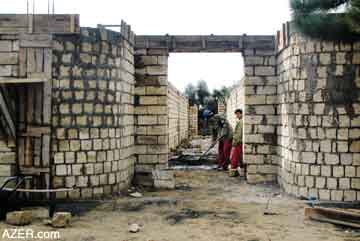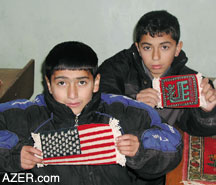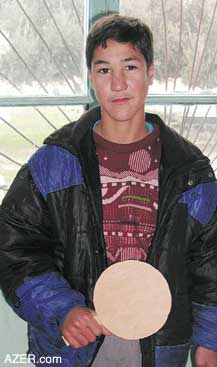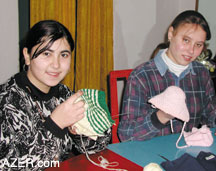|
According to Mehbara Khanim (Mrs. Mehbara), integration doesn't mean that these two groups study together on the same level in the same classrooms. The normal children study in classrooms, which are located in a totally different building. Simply, the two groups spend a lot of casual time together on the playground, in the dining room, at social events, and rehearsing for special programs. Some of the children are orphans, others come from families afflicted with extreme poverty, but who want so much for their children to have access to education. 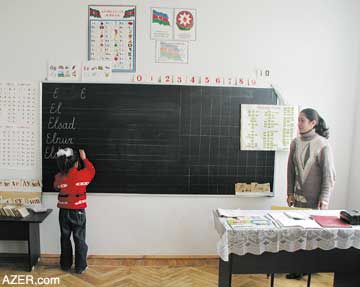 But then in 2003, Mehbara Khanim met up with the management of TOTAL, a French-based oil company. She brought up this idea with them. Together, they approached the Ministry of Education and began working closely with Deputy Minister Irada Huseinova and Arif Muradov, Head of the Department of Pre-school and General Education Schools. The project was then approved by Education Minister Misir Mardanov, and it gained the needed support from Finance Minister Avaz Alakbarov as well. Laws needed to be amended before the implementation of such new concepts could go into effect. In 2002, the Ministry of Education submitted legislation which was passed, stating that boarding schools could offer a full educational program attached to their limited program if they had the financial capabilities, adequate facilities, and trained staff to handle the situation. This means that healthy children could board at the same school as the disadvantaged children, but be promised a full, normal 11-year education. Growing up Together Mehbara Khanim sees advantages for both groups - those who have learning disabilities and those who are normal. "We try to foster an attitude of kindness and goodwill in the healthy children towards these less fortunate children. We ask their parents to talk about it when they're at home so that the children learn to be sensitive and helpful to those who are weaker and poorer than they are. I think such an attitude provides a basis for those children to become great philanthropists, humanists and good citizens in the future," says the Director. Mehbara Khanim believes that for the disadvantaged children simply growing up surrounded by normal children who express appropriate behavior is a great incentive and advantage. "When a teacher or a parent reprimands a child about his behavior, it's not as effective as when a normal child just provides a model of the correct behavior. Being around normal children also shapes the world of these disadvantaged children and increases their intellectual capacity. So the abilities of healthy children pass on to them as well." In turn, many of these disadvantaged children earn the respect from the healthy ones since they are very good at making things with their hands. For example, many are quite proficient at knitting, sewing, doing carpet weaving and woodworking. The Bigger Picture According to Rassim Akhundov, TOTAL's Manager for Corporate Relations Projects, the company decided upon the Sabunchu project when a new term made its way into corporate culture - "sustainable development". "Our company wanted to do some sort of project within the framework of this concept. We decided that instead of getting involved with several scattered projects, here and there, it would be more beneficial to carry out one major project so that we could make a significant difference in the lives of people. So we started exploring the idea by talking with the management about their problems at Sabunchu Boarding School. And that's when Mehbara Khanim mentioned this new concept of integrative education. "We started thinking how to implement this idea," says Akhundov. "We knew that classrooms would be needed to accommodate students in September and so we started rehabilitating them. But then we realized that adding one classroom year after year would not adequately meet the needs of the school. That's when we decided that it would be better to deal with the problem on a deeper level, rather than constantly repairing some little "this-or-that" thing. "Finally, the decision to construct an entirely new education building was made in October 2003. We felt that this was important for the future development of children. Due to the heavy financial contribution that it would entail, we decided to draw up a 5-year development plan. Construction is well underway now. I'm sure it will be ready for the beginning of the 2004 fall school year." Sabunchu Boarding School has been in existence for 42 years according to Mehbara Khanim. "Before TOTAL got involved, simply, there had never been any major repair work done on the entire building. We're starting to forget how bad it used to look now that it's being repaired and the work is progressing," she remarked. Mehbara Khanim adds to the list of TOTAL's contributions to their school in the past five years: "They repaired the heating room, the laundry room, remodeled the showers and brought them up to European standards, installed two big heavy duty industrial washing machines, repaired the water tank, installed three floors of window frames in bedrooms which were exposed to the windy north side. And they provided curtains and carpets. And yes," she adds, thinking of the joy and pleasure that children derive from celebrations and holidays, "TOTAL never forget these children on such occasions." Akhundov elaborates more on the rationale for the project. "TOTAL's corporate policy is to try to be sensitive to the needs of the local population and carry out a balanced approach between economic, environmental and social responsibilities. We've been very happy to collaborate with Mehraba Jafarova and Sabunchu Boarding School these past five years. We're so pleased to be able to facilitate the implementation of this pilot project for the first time in the Republic. Basically we selected this school and this project because its management has proven to be efficient and pro-active. There's no doubt in our minds that the end result will greatly benefit the children, their families and the community." Back to Index AI 11.4 (Winter 2003) AI Home | Search | Magazine Choice | Topics | AI Store | Contact us Other Web sites created by Azerbaijan International AZgallery.org | AZERI.org | HAJIBEYOV.com |

